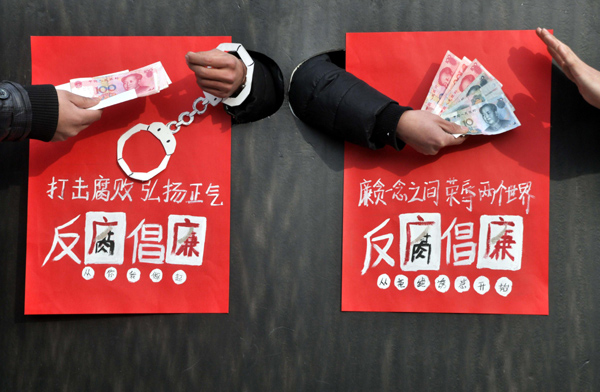Widening the scope
 |
|
Volunteers from Liaocheng University use performance art to raise public awareness to combat corruption and ensure clean governance. ZHAO YUGUO/CHINA DAILY |
Insiders said the commission will redouble its efforts this year and will widen the scope of its investigations to include all government offices and major State-owned enterprises.
Li Xiaohong, a senior CCDI official, said new guidelines would be issued by the end of June to standardize discipline inspection and better connect with the regulations to punish officials who break Party rules.
In addition, the scope of inspections will be expanded and accelerated to include as many as 2,100 cities and counties, and more than 4,700 government offices and departments, Li said.
According to the CCDI, local teams have conducted several rounds of inspections in more than 1,200 cities and counties since 2013. Meanwhile, 700 local governments and institutions were probed between 2013 and last year.
Li said the teams face heavy workloads, but the CCDI is ready to "improve its investigative capabilities and speed up its actions".
The commission unveiled the plans in response to President Xi Jinping's recent call for comprehensive rule of law and strict adherence to Party regulations.
Xi made the remarks at a recent CCDI meeting in Beijing, saying that last year's anti-graft campaign had been effective and the fight is "a matter of life and death" for the Party and the country. "All Party members should make compliance with the law and Party discipline their top priorities, so they will behave appropriately and build a clean government," he said.
Spotlight on SOEs
At the end of the Chinese New Year holiday, the anti-corruption watchdog launched a round of inspections of State-owned enterprises. So far, CCDI inspection teams have visited 26 large SOEs, including State Grid Corp, China Shipbuilding Industry Corp, China Huaneng Group and China National Petroleum Corp.
A senior CCDI official, who declined to be identified, said, "We will accept complaints about misconduct involving SOE's directors in their working and personal capacities via phone calls, e-mail and personal meetings."
At a meeting in January, the commission decided to redouble its inspections of SOEs, especially of directors in key positions.
Hao Mingjin, vice-minister of supervision at the CCDI, said: "The operations of some SOEs are closely related to national economic security. Corruption can result in huge losses and seriously compromise economic security. Some SOE directors have colluded with foreign forces to trade national assets in return for huge sums of money. We will resolutely fight abuses such as these."
In recent years, SOEs have been at the center of a number of cases of graft, mainly related to management issues, personal arrangements or audits that resulted in huge losses and posed potential threats to the country's economic security.
Dong Dasheng, a CPPCC member and former national deputy auditor-in-chief, said the overseas assets of SOEs under the direct supervision of the central government are valued at about 4 trillion yuan ($637 billion), but despite the huge amounts involved a formal audit has never been undertaken.
Moreover, some SOEs' directors are alleged to have bought and sold positions, embezzled public funds, or abused their power by arranging for their spouses and children to live overseas and run businesses, according to the CCDI.
Some officials bent the rules when awarding contracts, while others appointed family members to posts for which they were unqualified, or formed intra-party factions, according to the commission.
Since the Party Congress in 2012, CCDI teams have probed 14 major SOEs - in all, 118 central SOEs have been investigated - and more than 70 executives have been dismissed.
"It's essential that the overseas assets of central SOE's are audited to ensure that they are transparent, well-managed and not vulnerable to corrupt elements," said Dong, who added that a regular auditing mechanism for SOEs is urgently needed.
According to Xiong, from the North University of China, most of the SOE directors being investigated controlled valuable national resources, including petroleum, gas, coal and electricity. "To curb rampant corruption in SOEs, we need to break the monopolies and allow the market to determine the allocation of resources," he said.
Related Stories